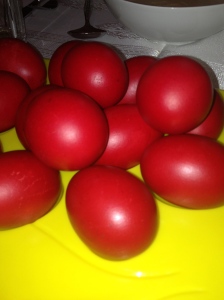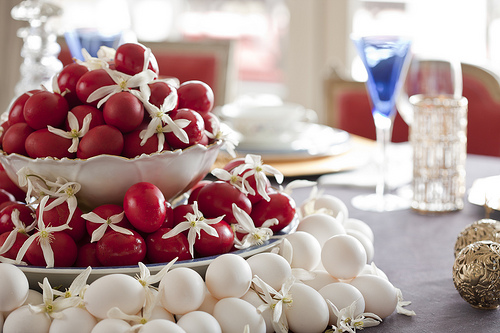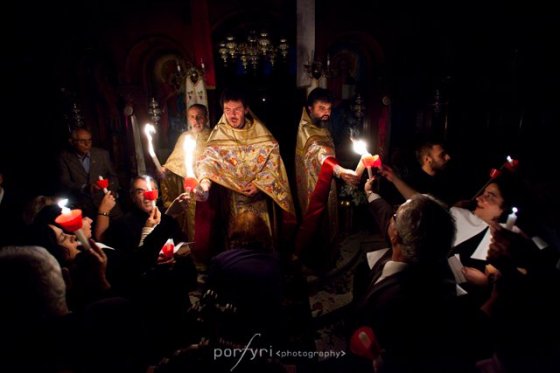
How to Be A Good Greek Cook – Join the #GreekCookingChallenge in 2014
Greek Cooking Challenge
April 2014
Red Eggs ~ For Greek Easter

This month we will be colouring Red Eggs in preparation for Greek Easter, Pascha (Πάσχα). It is Recipe Number 4 of the Greek Cooking Challenge.
Easter is always a very special family occasion. After Church on Saturday night we all go to yiaya’s house and eat. The table if full of amazing Greek food which includes some dishes that are traditionally cooked only at Easter time.
My Greek side of the family (my thea Sylvia) will make patza, which I think is similar to Magiritsa a soup made from meats such as goats head, tongue, liver and heart. Of course she also makes tsoureki, which is a traditional sweet Easter bread and domathes!
My husband’s yiaya is Cypriot and when we go to her house we will eat a different style of Easter food including Trahana soup, and avegolemeno for those who don’t like the trahana. There are also flaounas (1/2 with sultanas and 1/2 plain to suit everyone’s tastes).
At both houses, there will always be hard boiled eggs, which are dyed and decorated ready for the cracking game.
I would like to make tzoureki one day. Or maybe even patza or trakahana but too be honest, I don’t know if my cooking skills are good enough just yet. So this year, I think i’ll start off with an easy one…
So, for April’s Greek Cooking Challenge, we will be dying Red Easter Eggs!

Remember to share your photo on Facebook, Twitter or Instagram with the hashtag #GreekCookingChallenge and #RedEasterEggs
*
Step 1: Recipe
Andie Powers from the blog Assemble shares a recipe for dyeing Easter Eggs Naturally with Onion Skins. However, I plan to use the recipe that is on the back of the food dye packet that I purchased from the local Greek deli.
The instructions on the back of the packet say:
1. Boil the desired eggs and let them cool.
2. Add a glass of vinegar to a pot of cold or hot water
3. Dissolve the dye in the vinegar and water mixture
4. Put the eggs in to the pot and let them sit for 2-5 minutes
5. Take the coloured eggs out and place them on a napkin to dry
6. Use an oily cloth to polish the eggs and make them shiny
Step 2: Cook!
Red Easter Eggs have a symbolic meaning representing the blood of Christ and rebirth. Traditionally the red eggs are dyed on Holy Thursday which is the Thursday before Easter Sunday. In fact, this day is often called “Kokkinopempti” which means Red Thursday.
Try to schedule some time next Thursday to dye your Red Eggs!
Avoid cooking on Good Friday or Easter Sunday. However you can use Easter Saturday as a back up plan just in case you don’t get them done on the Thursday.
Step 3: Take A Photo and Share It
Once your Red Eggs are ready, take a photo of it! Be sure to share your photo on social media with the hash tags #greekcookingchallenge and #redeastereggs or #redeggs. You can share it on Instagram, Twitter or Facebook.
Or email directly to me at Sia@greekweddingtraditions.com.

This image is by Heather Christo – Click here to see her website and beautiful table decorations for Easter.
Step 4: Receive Your Gift
At the end of the month, the Greek Cooking Challenge subscribers will receive a pdf ebook of the Red Egg recipe enhanced with all your comments, secrets and notes, all gathered together and garnished with your photos. By the end of the year, you will have the perfect ebook of Greek food recipes, with home made pictures and secrets form within the kitchen of our subscribers. This gift will only be sent to you if you officially join the Greek Cooking Challenge – so if you haven’t already, you can still Sign Up Now!
~*~
The Greek Cooking Challenge is all about Learning How To Be A Good Greek Cook.
Here on the blog, we can all help each other to learn how to be good Greek cooks together.
So don’t forget to share your thoughts throughout this month, your cooking experiences, tips and recipe secrets. Share the things that have gone wrong or perfectly right with your recipe, so we can all learn from each other!
Good Luck Everyone!
~*~
Related posts you might love:
 Sia Aristidou is fascinated by the rituals and traditions celebrated in Greek culture. Sia writes about love, marriage, family and tradition and sells beautiful handmade wedding gifts at the Greek Wedding Shop.
Sia Aristidou is fascinated by the rituals and traditions celebrated in Greek culture. Sia writes about love, marriage, family and tradition and sells beautiful handmade wedding gifts at the Greek Wedding Shop.
Learn More About Greek Weddings & Traditions
Subscribe to the Blog and Follow Us:























 Sia Aristidou is fascinated by the rituals and traditions celebrated in Greek culture. Sia writes about love, marriage, family and tradition and sells beautiful handmade wedding gifts at the
Sia Aristidou is fascinated by the rituals and traditions celebrated in Greek culture. Sia writes about love, marriage, family and tradition and sells beautiful handmade wedding gifts at the 









